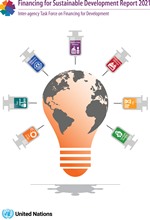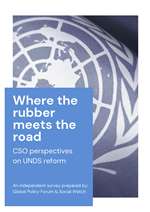Global Policy Watch
Published on Fri, 2021-07-02 18:52
The Fifth United Nations Conference on the Least Developed Countries (LDC5) will be held In Doha, Qatar in January 2022. Preparations are already underway to negotiate the Outcome Document to be adopted in Doha, which will serve as a new 10-year Programme of Action (PoA) for the LDCs. On 20 May 2021, Co-Chairs of the LDC5 Preparatory Committee bureau--Rabab Fatima, Permanent Representative of Bangladesh and Bob Rae, Permanent Representative of Canada--facilitated a virtual consultation with Civil Society Organizations (CSOs), designed to address policy prescriptions that LDC5 must deliver to meet the needs of people and planet. |
Published on Thu, 2021-05-06 17:47
In 2007, the UN General Assembly (UNGA) established an Ad Hoc Working Group on the revitalization of the work of the General Assembly (AHWG) which in recent years has addressed the selection process of the UN Secretary-General (S-G). The current S-G Antonio Guterres’ five-year term is set to expire on 31 December 2021 and Member States have begun activities for the 2021 selection and appointment for the UN S-G position, including a thematic debate on the selection process on 23 April. |
Published on Tue, 2021-04-06 14:14
In the lead-up to the UN’s Financing for Development Forum that takes place virtually from April 12-15, the 2021 edition of the Financing for Sustainable Development Report has been released. The report is published by the so-called Inter-Agency Task Force (IATF), which comprises numerous UN entities, but also the International Monetary Fund, the World Bank and the World Trade Organization. It is widely considered the most comprehensive source of data and analysis on development finance topics. |
Published on Thu, 2021-03-25 00:00
The video of the virtual Campaign Activation Workshop “Making the 2030 Agenda accountable: What is the role for civil society?” is now online. The virtual workshop was co-organized by Global Policy Forum, Global Policy Watch and Social Watch as part of the 2021 SDG Global Festival of Action and it was held on March 25, 2021. |
Published on Thu, 2021-03-18 11:02
The promise of the SDGs makes governments accountable but who is to be made responsible for global issues like the climate, the pandemic or finances? Join us to discuss this issue in a workshop hosted by Global Policy Forum, Global Policy Watch and Social Watch as part of the 2021 SDG Global Festival of Action. The workshop will be held on March 25, 2021 from 04:30 to 05:30 PM (CET). |
Published on Fri, 2021-02-19 14:13
The demands and urgency of addressing COVID-19 related issues have been added to the already crowded United Nations agenda, with consideration and intensity shifting up and down on the scale of priorities. |
Published on Thu, 2021-02-18 22:20
The United Nations and Member States begin the 2021 calendar confronted with the need to address the ongoing COVID-19 crisis and growing global inequalities. Despite the WHO’s efforts to make the COVID-19 vaccine “affordable and accessible for all” through the ACT Accelerator and calls by CSOs and UN leadership and world leaders for a People’s Vaccine (a global public good free from Intellectual Property Rights), the global vaccine distribution/rollout has been dominated by wealthy, developed countries, with little if any vaccines available for small and medium developing countries. |
Published on Mon, 2021-02-01 14:24
A survey among CSOs in “programme countries” evidences a very high level of commitment to UN values and principles, much dissatisfaction with the actual operations at country level and articulation of areas for improvement. For a number of CSOs, the UN system is appreciated for its inspiration, legitimization and promotion of the values they stand for, but is also viewed as a competitor for funds and influence, often displacing the social sector instead of building it. And frequently it is seen as both at the same time. |
Published on Thu, 2020-12-03 19:54
The General Assembly (GA) will host its 31st Special session in response to the coronavirus disease (COVID-19) pandemic on 3 and 4 December 2020. The UN Charter (Chapter IV, article 20) provides for the General Assembly to meet in special sessions which can be "convoked by the Secretary-General at the request of the Security Council or of a majority of the Members of the United Nations." UN special sessions are unusual, this will be 31st in the life of the UN and only the sixth since 2000. As the COVID-19 pandemic’s widespread effects range across development, peace, security, and socioeconomic affairs, there is no doubt about the special measures that the global community must address to confront the global pandemic. |
Published on Tue, 2020-11-03 19:32
Following the opening of the 75th Session of the UN General Assembly (UNGA) and a series of High-level meetings and events parallel to the General Debate, the UNGA plenary and committees have shifted to a pattern wherein the Member States debate and negotiate resolutions on a range of topics. Across the UNGA agenda, priorities include COVID-19 recovery, the UN Decade of Action--the final 10 years to achieve the Sustainable Development Goals (SDGs) ---and the call for necessary reforms for the UN to be effective across management, peace and security and development. Reform to the UN Development System (UNDS) will be a prime agenda item of the UNGA Economic and Finance (Second) Committee negotiations, with an outcome resolution of its Quadrennial Comprehensive Policy Review (QCPR) expected in November or December. |








